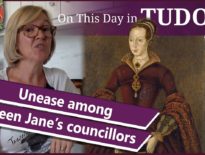On this day in Tudor history, 14th July 1575, evangelical reformer and translator, Richard Taverner, died at Woodeaton in Oxfordshire. He was laid to rest in the parish church at Woodeaton.
Richard Taverner is mainly known for his Bible translation, "Taverner's Bible", but there is far more to him than that, including his time as Thomas Cromwell's chief propagandist.
Find out all about Richard Taverner's life and career in today's talk.
Also on this day in Tudor history, 14th July 1551, fifteen-year-old Henry Brandon, 2nd Duke of Suffolk, and his fourteen-year-old brother, Charles, 3rd Duke of Suffolk, both sons of Catherine Willoughby, Duchess of Suffolk, and the late Charles Brandon, Duke of Suffolk, died at Buckden. The boys had been taken ill in a sweating sickness epidemic that had hit Cambridge. Find out more in last year’s video:
Also on this day in history:
- 1486 – Death of Margaret of Denmark, Queen of Scots and consort of James III, at Stirling Castle. She was buried in Cambuskenneth Abbey. False rumours spread that she had been murdered by poison by John Ramsay, 1st Lord Bothwell, but there was no evidence of this.
- 1514 – Death of Cardinal Christopher Bainbridge, also Ambassador and Archbishop of York, in Rome. His death was controversial, in that his servant, Raimondo da Modena, confessed to poisoning him on the orders of Silvestro Gigli, Bishop of Worcester, and the English ambassador at Rome. He was buried in chapel of the English Hospice (now the English College) in Rome.
- 1544 – Henry VIII landed at Calais in preparation for the Siege of Boulogne, which began five days later.
- 1599 – Death of Sir Robert Salesbury, member of Parliament, Justice of the Peace and Deputy Lieutenant of Denbighshire.
- 1621 – Death of Edmund Hooper, composer and organist of Westminster Abbey and the Chapel Royal, in London. He was buried in the cloisters of Westminster Abbey.
Transcript:
On this day in Tudor history, 14th July 1575, evangelical reformer and translator, Richard Taverner, died at Woodeaton in Oxfordshire. He was laid to rest in the parish church at Woodeaton.
Taverner is known for his Bible translation known as “Taverner's Bible”, or, to give it its full name, “The Most Sacred Bible whiche is the holy scripture, conteyning the old and new testament, translated into English, and newly recognized with great diligence after most faythful exemplars by Rychard Taverner”, but let me tell you more about this man and his work.
• Richard Taverner was born in around 1505 and was the eldest son of John Taverner of North Elmham, Norfolk, and his first wife, Alice Sylvester.
• Taverner was educated at Corpus Christi College, Cambridge, and then Cardinal College, Oxford, where his relative, composer John Taverner, was master of the choristers.
• He graduated from Cardinal College in 1527 and then returned to Cambridge in 1529, attaining his MA in 1530.
• Taverner was a member of a group accused of heresy in Oxford in 1529 and had to do public penance.
• In 1530, he wrote to Thomas Cromwell following the death of his friend, who had acted as his patron. Cromwell was able to secure financial help for Taverner from Thomas Howard, 3rd Duke of Norfolk, enabling Taverner to stay on at Cambridge.
• After Cambridge, he studied law at Strond Inn and then the Inner Temple.
• In 1532, Taverner completed a translation of “Encomium matrimoni”, an attack on clerical celibacy by Erasmus. He sent it to Thomas Cromwell and, as his biographer, Andrew W Taylor points out, within the year he was acting a Cromwell’s publicist and was certainly at court by 1534.
• In around 1536/1537, Taverner was appointed as a clerk of the signet, and in late 1537 he married Margaret Lambert. The couple went on to have four sons and three daughters.
• In 1539, he was rewarded with the lease of Alvingham Priory, in Lincolnshire, which had been surrendered to the crown in late 1538, and two rectories in the county.
• Andrew W Taylor describes Taverner as “Cromwell's principal propagandist for religious reform” and Cromwell commissioned him to produce translations of evangelical works.
• In 1539, he produced the Taverner Bible, which replaced the 1537 Matthew Bible. However, Taverner’s work was replaced after just a few months by the Great Bible.
• In 1540, Taverner’s patron and employer, Thomas Cromwell, fell from power and was executed, putting a stop to Taverner’s religious work. Taverner himself was temporarily taken into the custody of Bishop Stephen Gardiner.
• In December 1541, he found himself in trouble again. His mother-in-law and wife told him of gossip regarding Anne of Cleves being pregnant by the king and Taverner did not report this straight away. Again, he was temporarily taken into custody by Bishop Gardiner.
• In 1544, Taverner served as a soldier in Henry VIII’s French campaign and between 1544 and 1545 was rewarded with properties and land including Woodeaton Manor in Oxfordshire.
• In 1547, he served as a member of Parliament for Liverpool and in 1552, he received a licence to preach.
• Although Taverner greeted Mary I’s accession by writing “An Oration Gratulatory”, he lost his position as clerk of the signet in Mary I’s reign, and retired to Surrey while work was done on Woodeaton.
• In 1558, Elizabeth I came to the throne and Taverner addressed an epistle of congratulations to the new queen, who offered him a knighthood, which he declined. He served as a justice of the peace and high sheriff of Oxfordshire. He also preached regularly at St Mary’s Church in Oxford.
• In 1562, following the death of his first wife, Taverner married Mary Harcourt and the couple went on to have a son and a daughter.
• Taverner died on this day in 1575 and on 29th July was buried beside his first wife, Margaret.
• Richard Taverner was responsible for a number of religious translations, including work by Erasmus, Melancthon and Capito, but is best known for his Bible translation. Here's a link to read Taverner’s Bible if you’re interested. https://archive.org/details/1539TavernerBible



Interesting, because I haven’t heard of the Taverner Bible. The Matthew Bible and Great Bible have overshadowed it. Interesting information. Cheers.